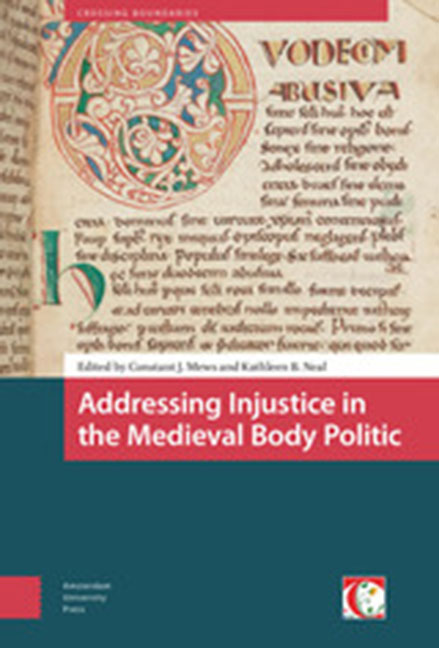Book contents
- Frontmatter
- Contents
- Acknowledgements
- Abbreviations
- Note on References
- List of Tables and Illustrations
- Introduction: Justice and its Abuse in the Medieval Body Politic
- 1 The De XII abusiuis saeculi: Contexts and Textual Traditions
- 2 The Irish Background to the De XII abusiuis saeculi
- 3 ‘Each in the Calling to Which They are Called’: Images of Authority in the De XII abusiuis saeculi
- 4 Transforming Irish Traditions: De XII abusiuis saeculi and Justice in the Frankish World, c. 750–1050
- 5 The Unjust King and the Negligent Bishop: Addressing Injustice in Eleventh and Twelfth-Century England and Germany
- 6 Reflecting on Abuses in Religious Life: From The Twelve Abuses of the Cloister to The Cloister of the Soul
- 7 Preaching the Body Politic: John of Wales and Franciscan Political Thought in the Late Thirteenth Century
- 8 Justice and Its Abuses in the Speculum justiciariorum
- 9 Addressing Abuses and Injustice in the Court of Philip the Fair: The De informatione principum of Durand of Champagne
- 10 ‘Perfect Justice Weighs Everything on a Balanced Scale’: Italian Friars on Equity, the Common Good, and the Commune c. 1270–c. 1310
- 11 Some Late Franciscan Rewritings of the Twelve Abuses
- Appendix: On the Twelve Abuses of the Age A Translation
- Bibliography
- Index of Biblical References
- Index of Manuscripts
- General Index
6 - Reflecting on Abuses in Religious Life: From The Twelve Abuses of the Cloister to The Cloister of the Soul
Published online by Cambridge University Press: 14 February 2024
- Frontmatter
- Contents
- Acknowledgements
- Abbreviations
- Note on References
- List of Tables and Illustrations
- Introduction: Justice and its Abuse in the Medieval Body Politic
- 1 The De XII abusiuis saeculi: Contexts and Textual Traditions
- 2 The Irish Background to the De XII abusiuis saeculi
- 3 ‘Each in the Calling to Which They are Called’: Images of Authority in the De XII abusiuis saeculi
- 4 Transforming Irish Traditions: De XII abusiuis saeculi and Justice in the Frankish World, c. 750–1050
- 5 The Unjust King and the Negligent Bishop: Addressing Injustice in Eleventh and Twelfth-Century England and Germany
- 6 Reflecting on Abuses in Religious Life: From The Twelve Abuses of the Cloister to The Cloister of the Soul
- 7 Preaching the Body Politic: John of Wales and Franciscan Political Thought in the Late Thirteenth Century
- 8 Justice and Its Abuses in the Speculum justiciariorum
- 9 Addressing Abuses and Injustice in the Court of Philip the Fair: The De informatione principum of Durand of Champagne
- 10 ‘Perfect Justice Weighs Everything on a Balanced Scale’: Italian Friars on Equity, the Common Good, and the Commune c. 1270–c. 1310
- 11 Some Late Franciscan Rewritings of the Twelve Abuses
- Appendix: On the Twelve Abuses of the Age A Translation
- Bibliography
- Index of Biblical References
- Index of Manuscripts
- General Index
Summary
Abstract
The twelfth century is well-known for producing a number of well-known satires on abuses within religious life, notably by Bernard of Clairvaux. Less attention, however, has been given to a treatise of the Augustinian canon, Hugh of Fouilloy, about the twelve abuses of the cloister, clearly inspired by De XII abusiuis saeculi. Hugh then expanded this treatise into a two-book version, De claustro animae (On the Cloister of the Soul), subsequently enlarged into a four-book version. Hugh's reflections, along with the original treatise on twelve abuses of the age, helped shape awareness of abuses in religious life for over three hundred years.
Keywords: Abuses, Augustinians, Hugh of Fouilloy, religious life, monastic reform, Cloister of the Soul.
Within Christian tradition, complaints about abuses within society and religious practice tend to recur in every generation. Yet particular periods generate more acute moments of anxiety which leave their mark in the written record. The chronological distribution of surviving manuscripts of the De XII abusiuis saeculi suggests that after an initial surge of interest in this text on the continent in the ninth century, there was a period of relative decline in the tenth century, followed by a multiplication of copies in the eleventh and twelfth centuries. One could argue that this simply reflects a broader explosion in scribal activity during this period. In this chapter, however, I shall explore how DDAS provided a stimulus for a renewal of interest in religious life. Two categories in particular were missing from its list: those in religious life and those holding positions of responsibility within religious life. I shall explore how DDAS, which had circulated for many centuries within a monastic milieu, would find a new lease on life in the twelfth century in communities of canons regular, committed to the Rule of Augustine.
DDAS makes no explicit reference to monks, abbots, or clerics. While it does have an important chapter about a negligent bishop, its failure to make explicit reference to the way of life of a monk or an abbot would provoke Hugh of Fouilloy (c. 1100–c. 1174) to compose a quite different treatise, De duodecim abusionibus claustri [DDAC], with which it is often confused. Hugh certainly knew DDAS, identifying it as a work of Augustine when he mentions its discussion of an old man without religion.
- Type
- Chapter
- Information
- Addressing Injustice in the Medieval Body Politic , pp. 173 - 200Publisher: Amsterdam University PressPrint publication year: 2023



